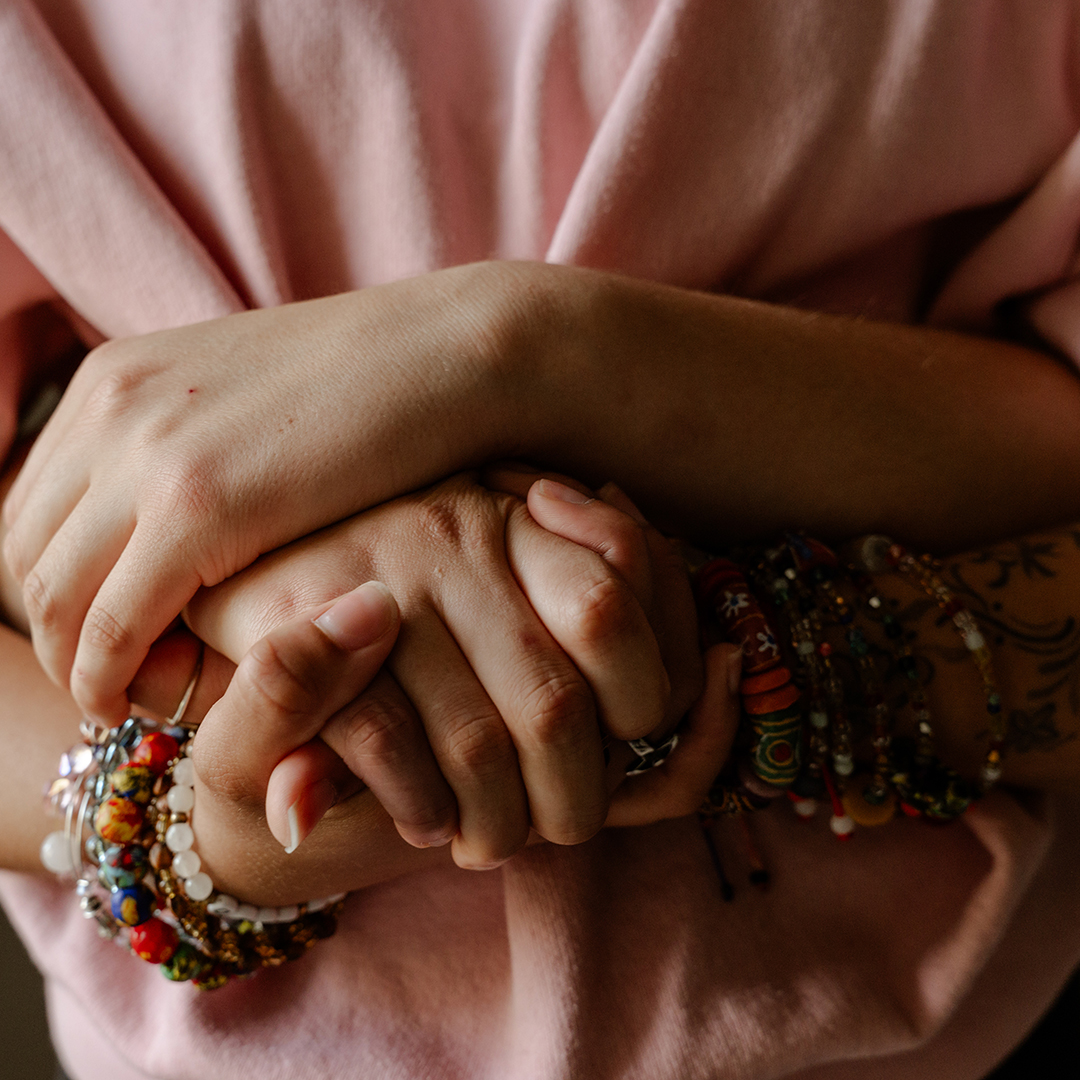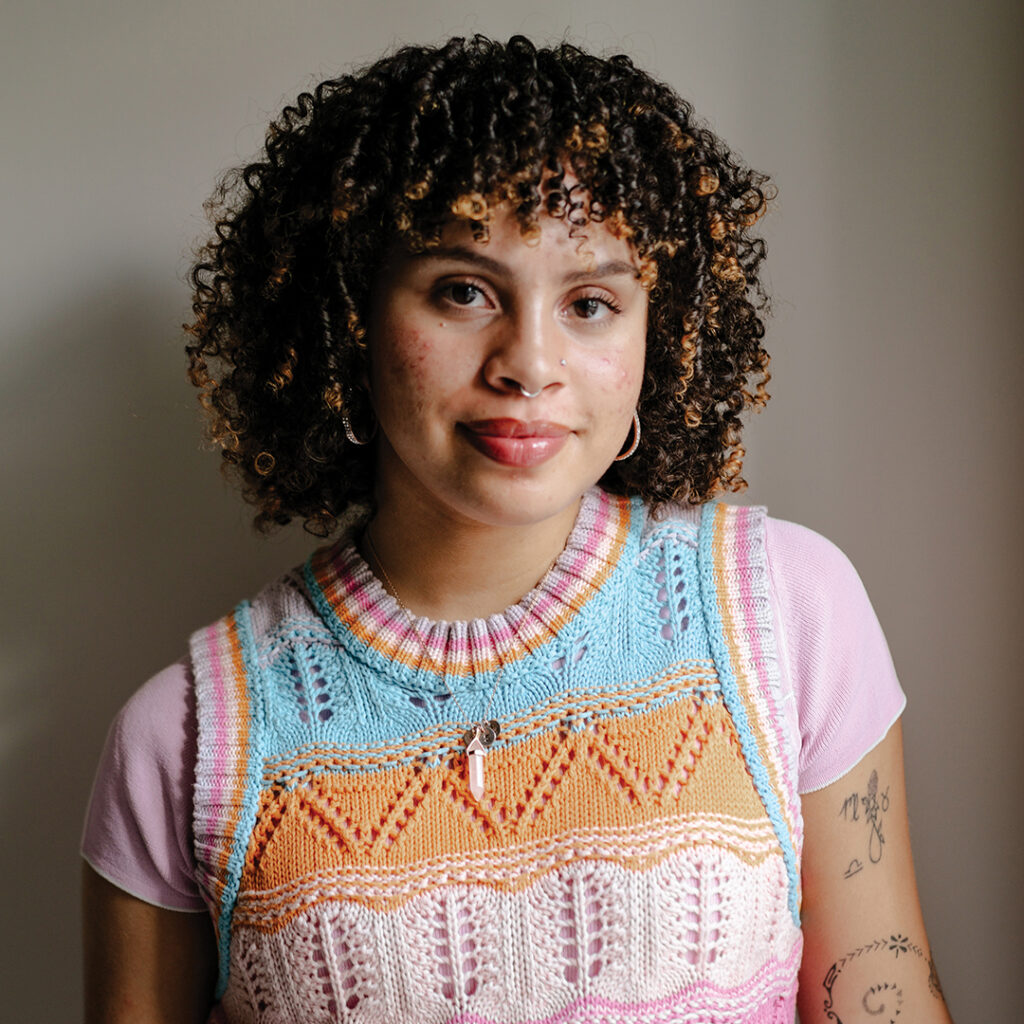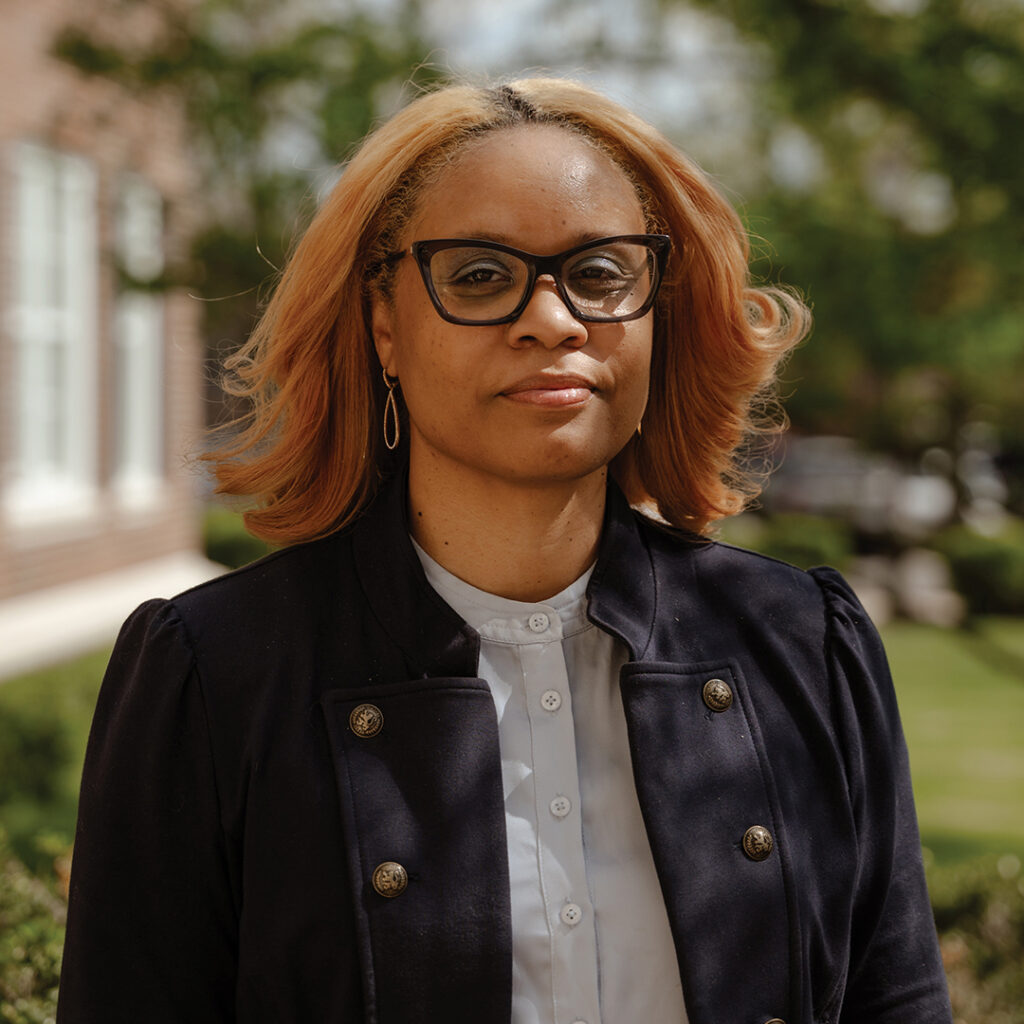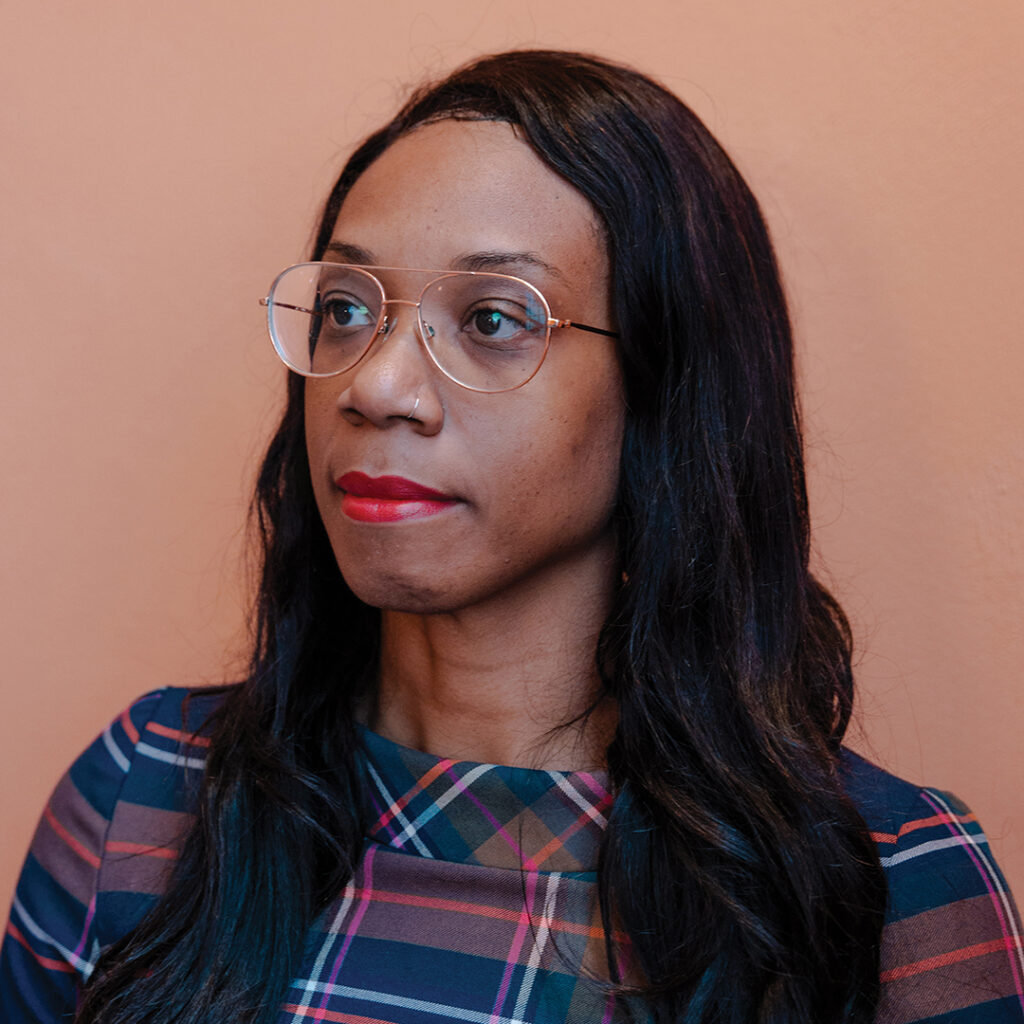Baby steps
Students take course to become certified doulas and help improve maternal health.

A course at TCNJ trains students to be doulas.
One by one, the 15 students paired up on soft mats in a room in Trenton Hall on a Saturday morning in early February. When the instructor gave them the signal, some of the students lay down on their backs while the others stood at the ready. At the instructor’s next direction, the classmates who were standing crouched down to help their partners stretch. Together, they identified areas of discomfort, and the crouching students suggested how their peers could better position their bodies to relieve tension. The students who were lying down relaxed their upper body muscles and slowly stretched their legs with care.
Though the moves helped the students test their flexibility, this wasn’t a weekend yoga class.
Instead, they were simulating pregnancy — and the sometimes lifesaving comfort measures that ease labor pain.
The students were also making history in New Jersey: They were completing a weekend intensive program as part of a new TCNJ semester-long training course to become certified doulas, advocates hired to provide support to pregnant and postpartum women. It is the first program in the state that offers college credit for doula training.
The activity was just one way the students practiced providing critical physical and emotional guidance to pregnant people, skills that have made doulas indispensable for those most vulnerable during pregnancy. Led by the weekend’s instructor, Nikia Lawson, a certified birth doula and trainer with DONA International, the students acted out improv skits for each stage of labor. If Lawson told them the scenario was “early labor,” students practiced walking their clients through breathing and relaxation techniques. When the next scenario was “client in active labor,” students demonstrated how they’d help a client change positions, roll on a large rubber birthing ball, or breathe through contractions. Researchers have found that there are fewer birth complications when mothers are matched with doulas who have this kind of hands-on training.

“Those two days were transformative because we learned about everything from conception to late-stage labor and the needs of families that recently delivered,” says Cielo Salgado-Cowan ’25, who enrolled in the course as an elementary special education and women’s, gender, and sexuality studies double major.
What struck Salgado-Cowan the most during the 16-hour program was how the skills she and her classmates practiced could help reverse centuries of medical racism and disproportionately bad birthing outcomes for families of color, particularly in New Jersey. “We looked at everything through a lens of social justice,” she says.
For example, there’s a prominent implicit bias among medical professionals today that Black women have a higher pain tolerance than white women, leading to the systematic undertreatment of pain among Black women. When it comes to pregnancy and childbirth, Black women, no matter their educational background or social class, are most at risk for complications and death.
Salgado-Cowan says she now understands the bigger implications of her role as a doula. “I am there to comfort the person who will give birth physically and emotionally and to be a source of knowledge for them,” she says. “This is about giving a woman the support and resources she needs to make her own informed decisions about her life, her body, and the birth of her child. It’s about empowerment.”
The impetus behind the creation of the course, Foundations in Community Birthwork: The Doula Method, is the sobering statistics about maternal mortality across the country and in New Jersey in particular. Maternal mortality is the death of a woman during pregnancy, at delivery, or soon after delivery, according to the Centers for Disease Control and Prevention, which most recently said the national rate was a whopping 32.9 deaths per 100,000 births in 2021.
What’s more is that Black women were nearly three times more likely than white women to die from pregnancy complications. In New Jersey, which ranks 27th for maternal deaths, the outlook is worse: A Black woman is seven times more likely to die from maternity-related complications than a white woman, and a Black baby is almost three times more likely than a white infant to die Ria Rodney ‘08 saw a need in the community and recognized TCNJ students could make an impact. before their first birthday. Many of these birth-related deaths can be prevented with proper care, numerous reports have found.

“When we move from the statistics to the human experience, time after time and story after story, we hear, ‘I do not feel heard. I said I was in pain and nobody did anything,’” says Natasha Patterson, a public health professor who helped develop the doula certification course. Patterson’s research over nearly 20 years has focused on racial and ethnic health disparities, so when New Jersey’s First Lady Tammy Murphy invited her to attend a yearly Black maternal health leadership summit for the first time in 2018, a pathway for the course opened. Out of the summit came the Nurture NJ Strategic Plan in 2021, the state’s official blueprint to decrease maternal mortality by 50% over five years and make the state “the most equitable place in the nation to give birth and raise a baby.”
According to Patterson, every kind of stakeholder was at the table at the summit, identifying how they’d do their part. Higher education leaders pledged to boost training. “The problem we’ve been trying to tackle is big,” Patterson says.
The course further came into focus when Medicaid covered doula care, and New Jersey became the third state in the country to expand this coverage. At the same time, the state required doulas seeking Medicaid reimbursement to be “community doula trained.” That is, trained in cultural competency (knowledge of how a family’s values, behaviors, and beliefs are unique and inform their decisions and experiences) and steeped in an understanding of how the social determinants of health (where someone is born, lives, and works) impact health outcomes.
As a result, state officials realized that there weren’t enough doulas trained according to these guidelines. The development of the course became urgent. Patterson teamed up with TCNJ alumna Ria Rodney ’08, who had already pitched the idea of a doula program to the women’s, gender, and sexuality studies department, where she teaches courses as an adjunct professor. Rodney is a public health advocate with 15 years of healthcare experience as a registered nurse, social worker, and doula. She’s also the director of Nurture NJ, the multiagency women’s health initiative that Murphy launched.
“My idea was to bring my experiences and my training to my alma mater,” says Rodney, who drew on her own doula training to help develop the course.
Patterson and Rodney sat down and determined what students would learn and practice to be certified doulas by the end of the semester. “Some might think you have to be a nurse or have certain experiences. Those things are not true. You have to have a passion for public health and advocacy, and then you’ll learn the rest,” says Rodney.

The interdisciplinary curriculum, which took almost four years to develop and be approved, focuses on health disparities and asks students to analyze how race, power, and privilege function in the healthcare system. “I think the general public believes that when we have these horrible outcomes, it’s the result of an individual’s choices, that if someone had advocated for themselves or done more research, they’d be alive,” says Rodney. “But the reality is that a lot of this is systemic racism and errors in our healthcare system.” Seeing the need for doulas as a social justice issue resonated with Cielo Salgado-Cowan ’25, who enrolled in the course.
This foundation connects to the course’s focus on doulas as advocates. To be a doula is to speak up for clients throughout their pregnancy, labor, and postpartum journey. Moms in labor may not be able to speak up for themselves for a variety of reasons, including language barriers and discomfort. Doulas are trained to step in and go up the chain of command in any setting.
To meet the state’s community doula requirement, students become versed in the unique challenges that families in Mercer County face. They learn what it takes to support moms who have postpartum depression, also known as the “baby blues,” and they learn how to support those dealing with substance abuse or intimate partner violence. They’re trained to connect families to resources that can help them physically and emotionally. For example, if a family is facing housing or food insecurity, it’s the doula’s role to connect them with community partners who can help. In addition, taking care of families when they get home after birth is another major facet of training. “It could be as long as six weeks before women have a postpartum follow-up appointment,” Rodney says. “The doulas close those gaps in wait times.”
As part of the course, students are connected to clients through TruDoulas of New Jersey and paired up with families to complete prenatal assessments and support them through births.
“I really wanted to be a part of this to support women and advocate for them,” says Emma Kenney, a senior public health major enrolled in the course. “I was inspired by the women in my life who chose some of the more natural doula-supported options that we have learned about in class.” Kenney’s mother planned to get an epidural, an anesthetic that can help relieve pain during childbirth, the f irst time she gave birth but arrived at the hospital too late. “My mom decided that if she could do it naturally once, she could do it again. And then she did it seven more times,” says Kenney. “I want to help women to have an empowered and dignified birth.”
Salgado-Cowan’s mother had a doula for her birth and the birth of her brother, a decision that made things easier for her Black and Puerto Rican family. “My mom has always talked about the positive impact of having a doula, how she felt heard, and how it was really beneficial for her,” she said.
Rodney felt called to doula work after two of her close childhood friends, both healthy young Black women, almost died in childbirth. “They’re both alive and well today, but I wonder how their stories would have been different if they had had doulas to advocate for them,” she says.
Students will walk away from the course this semester having met the DONA International requirements, meaning they can practice as doulas internationally. By the end of the term, they also will meet the cultural-competency requirements to be able to bill Medicaid as a provider.
Patterson and Rodney hope the class can grow in the coming years despite funding challenges.
They secured a grant for this semester from the Burke Foundation, a private organization that funds initiatives to improve the lives of children and had already set a goal of training and certifying 1,000 doulas in the coming years. But they need more funding to avoid passing the cost on to students and to allow community members to sign up.
Since First Lady Murphy launched Nurture NJ, the state has moved from 47th to 27th on the list of states where women can have successful pregnancies and births.
“That’s a testament to the state’s commitment, and doulas are one piece of the puzzle,” Rodney says. “Our community will benefit from students being out there.”
Photos by Caroline Gutman
Posted on May 30, 2024

